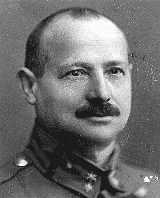You searched for: Ghettos
<< Previous | Displaying results 1101-1125 of 1236 for "Ghettos" | Next >>
-
Jakab Katz
ID CardJakab, a religious Jew, was the father of eight children. In the early 1900s he sailed to America, paying his way by shoveling coal on the ship. In New York he earned enough money to help two of his daughters immigrate. Returning to Buj, he eventually moved his family to Zalkod, a small town in northeastern Hungary. There, helped by his wife, Terez, and his son, Miklos, he ran a store and a farm. 1933-39: Jakab's daughter, Sadie, and her two children, Lillian and Arthur, are visiting from America. The…
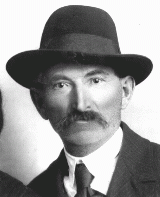
-
Zelda Piekarska
ID CardZelda was born to a close-knit Jewish family in Sosnowiec, a city in the coal-mining region of Poland. Her father owned a restaurant and also co-owned a chocolate and candy factory. Zelda loved to dance; she was an excellent tap dancer. 1933-39: On September 4, 1939, the Germans entered Sosnowiec. Zelda's family was at her father's store when the German tanks rolled down the street. She saw people lying on the ground but didn't understand why. Her mother told her they were dead. Later, the Germans forced…
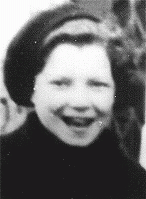
-
Sophie Weisz
ID CardSophie was born to a prosperous Jewish family in a village near the Hungarian border known for its winemaking and carriage wheel industries. The village had many Jewish merchants. Her father owned a lumber yard. Sophie loved to dance in the large living room of their home as her older sister, Agnes, played the piano. 1933-39: Sophie's father believed in a Jewish homeland and sent money to Palestine to plant trees and establish settlements there. When she was 10, she was sent to a school in nearby Oradea…
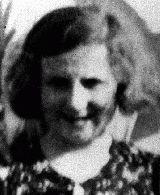
-
Guta Blass Weintraub
ID CardGuta was born to a Jewish family in the Polish city of Lodz, the nation's second-largest city and the center of its textile industry. Her father, a successful businessman, owned a clothing factory, which produced uniforms for the Polish army. Guta attended a private Jewish school in Lodz. 1933-39: On September 1, 1939, not long after Guta began secondary school, the Germans invaded Poland. Polish soldiers moved quickly through Lodz to defend the border, but a few days later, after being beaten, they came…
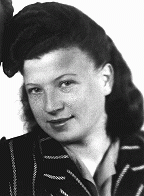
-
Shaye Rothkopf
ID CardShaye's town in the province of Lodz had a Jewish community that comprised almost one-third of the town's population. Shaye was very young when his father died during World War I. Afterwards, his grandparents helped to support his family. When Shaye was a teenager, his mother died. He and his siblings then lived with their grandparents. 1933-39: Swimming was Shaye's favorite pastime and he'd go with his friends to the banks of the Vistula River on every possible occasion. He worked in Lodz for a company…
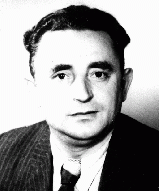
-
Isachar Herszenhorn (Irving Horn)
ID CardIsachar was born to a Jewish family in the Polish city of Radom, approximately 75 miles south of Warsaw. The city was the center of Poland's leather-tanning industry. Isachar's father worked as a salesman for a nearby tanning factory. His father was a successful salesman and the family lived comfortably. 1933-39: During registration for Isachar's first-grade class in 1934, a Jewish boy was pushed down the stairs. When his mother confronted the principal about the incident, all he said was that the boy had…
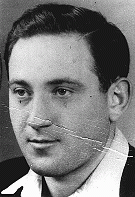
-
Rivka Rzondzinski
ID CardThe mother of six children, Rivka lived 35 miles east of Warsaw in the small predominantly Jewish town of Kaluszyn. The Rzondzinski family was very religious. When Rivka's husband, Fiszel, died in the early 1930s, she and her oldest daughter, Channa, opened a newspaper kiosk near the Kaluszyn railroad station. 1933-39: When Germany invaded Poland several days ago, Rivka's daughter Raizel's husband and her two sons fled eastward to the USSR with other Jewish men. They were afraid that the Germans would…
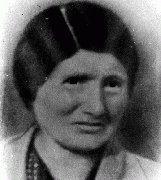
-
Sevek Fishman
ID CardSevek's religious Jewish family owned a haberdashery business in Kaluszyn, a suburb of Warsaw. The oldest of six children (three boys and three girls), Sevek completed high school and was then apprenticed to a tailor. 1933-39: Each Friday, before the Sabbath began, Sevek's mother asked the neighbors if they had enough food for the Sabbath. If they didn't, she brought them a meal. Although Sevek belonged to a non-religious Zionist group, Ha Shomer ha-Tsa'ir, and didn't wear a skullcap like religious Jews,…
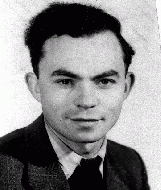
-
David Klebanov
ID CardBorn in the town of Volkovysk when it was part of Russia, David was the son of middle-class Jewish parents. When the family's life was disrupted by World War I and the Russian Revolution of 1917, they moved to Borisov and Kiev before finally settling in the Polish city of Bialystok. After completing secondary school in 1925, David studied medicine at Stefan Bathory University in Vilna. 1933-39: After medical school David served one year in the Polish army. Then he practiced obstetrics at a beautiful…
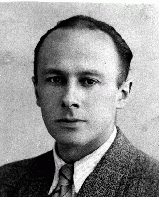
-
Maria Terez Halpert Katz
ID CardAlso known by her Yiddish name, Tobe, Terez was raised in a religious Jewish family. Her father and two brothers were rabbis. Though Terez was a promising student, she didn't pursue an advanced education because her traditional family wanted her to marry. So Terez married Menyhert Katz and moved to the town of Kisvarda [in Hungary]. There, she raised five daughters and one son; two other sons died. 1933-39: Terez's twin sons died when they were 8 months old, and she was convinced that their death was a…
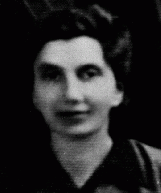
-
Izabella Katz
ID CardIzabella was one of eight children raised in a religious Jewish family in the small town of Kisvarda in northeastern Hungary. Every Friday Izabella and her brother and four younger sisters went to the library to borrow the maximum number of books for their mother. Izabella attended public schools and longed to move to a big city. 1933-39: Antisemitism was prevalent. Izabella can't count the number of times she was called "smelly Jew." Her family cringed at "Heil Hitler" speeches from Germany on the radio…
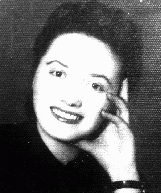
-
Felicia Karo
ID CardFelicia grew up in a Jewish family living in a predominantly Catholic neighborhood in the large, industrial city of Lodz. Her father's side of the family had lived in Poland for 400 years. He was the principal of a Jewish secondary school for boys. Known affectionately by family and friends as Lusia, Felicia attended a bilingual Jewish school in which both Hebraic and Polish subjects were taught. 1933-39: When Felicia was 12 she heard a lot of bad things about the Nazis. A Polish-born German Jewish…
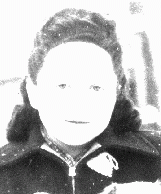
-
Josel Gerszonowicz
ID CardThe oldest of eight children, Josel was born in Miechow, a small town in south central Poland. His father was a machinist and locksmith. As a boy, Josel spent long days learning Hebrew in the Jewish school and taking general subjects at the public school. He was 13 years old when he left school to work in his father's shop. 1933-39: Josel met his wife, Esther, through a matchmaker, and they settled in nearby Dzialoszyce, a town with a Jewish community of about 7,000, and a beautiful synagogue that had…
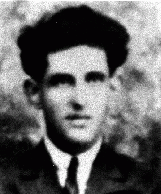
-
Chaie Sura Kisielnicki
ID CardChaie Sura was the youngest of three children born to Jewish parents living 35 miles east of Warsaw in the small, predominantly Jewish town of Kaluszyn. Her father owned a wholesale grocery store, a restaurant and a gas station, which were located together on the busy main road. The Kisielnicki family lived in rooms in the same building as their business. 1933-39: When Germany invaded Poland several days ago, Chaie Sura's father and brothers fled eastward towards the USSR with other Jewish men who were…
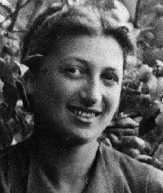
-
Abram Kisielnicki
ID CardThe oldest of three children, Abram was born to Jewish parents in the small, predominantly Jewish town of Kaluszyn, 35 miles east of Warsaw. Abram's father owned a wholesale grocery store, a restaurant and a gas station, all of which were located on the heavily traveled main road. Abram went to public elementary school and also received religious instruction. 1933-39: Abram was 21 when the Germans invaded Poland. Abram, his father, and his brother Majlech fled eastward towards the Soviet Union because…
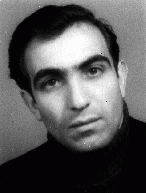
-
Johanna Falkenstein Heumann
ID CardThe oldest of five children, Johanna was born to Jewish parents living in a small town near Cologne. Her father owned a cigar factory. After Johanna graduated from high school, she worked in a bank in Cologne. At 22 she married Carl Heumann and the couple settled in the village of Hellenthal near the Belgian border. There they owned a general store. The couple had two daughters, Margot and Lore. 1933-39: A year ago Johanna's family moved to nearby Bielefeld, and she enrolled Margot and Lore in the city's…
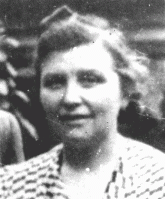
-
Edek Blonder
ID CardThe Blonder family lived in a two-room apartment in the back of a store. Edek was the third of eight children. His father eked out a meager living by tutoring students in Jewish subjects, and beginning in 1930 he worked distributing food vouchers to the poor. 1933-39: After graduating from secondary school, Edek was invited to play soccer professionally on the local Club Maccabi team, which was part of a Jewish soccer league. Club Maccabi arranged for him to attend trade school to learn cabinet making at…
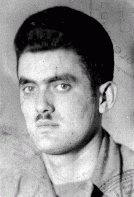
-
Jules Izrael Zajdenweber
ID CardJules grew up in a Jewish family in the industrial city of Radom, which had a large Jewish population and was known for its armaments industry. The Zajdenwebers spoke Polish and Yiddish at home. Jules' father was a textile salesman and his mother was a corset maker. Jules, whose nickname was Ulek, attended public schools in Radom and was a member of a Zionist youth organization. 1933-39: Jews weren't safe in certain neighborhoods. Some classmates at Jules's Polish state secondary school belonged to…
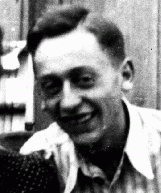
-
Fritz Silten
ID CardFritz was the youngest of two sons born to a Jewish family in the German capital of Berlin. In the late 1920s he earned a doctorate in chemistry and pharmacy. In 1931 he married Ilse Teppich, and in 1933 the couple had a daughter, Gabriele. 1933-39: Fritz worked in his father's pharmacy until 1938, when the Nazis forced them to sell the business for a fraction of its value to an "Aryan" German [Aryanization]. Leaving his parents behind was agonizing, but concern for the safety of his wife and daughter…
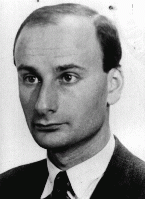
-
Alta Koppff Himmelfarb
ID CardThe daughter of a rabbi, Alta was one of six children raised in a Yiddish-speaking Jewish family in the town of Koprzewnica [in Poland]. Alta was one of the prettiest girls in town, and when she was 19 she married Shaul Himmelfarb, a childhood friend. Shaul opened a grocery store, and Alta ran the store on market days when Shaul was away buying merchandise. The couple had three children. 1933-39: On September 1, 1939, Germany invaded Poland. Soon after, German troops entered Koprzewnica. While fighting…
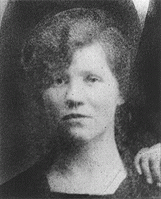
-
Wolf Himmelfarb
ID CardWolf was the eldest of three children born to Yiddish-speaking, religious Jewish parents in Koprzewnica, a small town in southern Poland. His father ran a grocery store, where his mother would help out on Thursdays. The store was located in the house of Wolf's grandmother, and Wolf, his brother, Izik, and sister, Chana, would play in a large yard in the back. 1933-39: Wolf started attending school a year late, at 8, so that he and his younger brother could share the same books. In the third grade, Jewish…
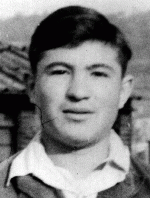
-
Josef Edelstein
ID CardJosef was one of seven children born to a Jewish family in the Czechoslovakian village of Hvozdnice. After graduating from school, Josef worked as a salesman in Vienna. In 1912 he married Ida Kohn, and the couple had a son before he left to fight for Austria in World War I. After the war, they had a daughter. 1933-39: Because of the economic depression of the 1930s, it was difficult for Josef to make a living in his wholesale shoe business. In 1938 the Germans annexed Austria [the Anschluss], and soon…
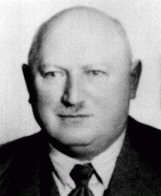
-
Bertha Falkenstein
ID CardOne of two children, Bertha grew up in the small village of Bergheim where her father was a farmer. After she married Leo Falkenstein, the couple settled in Hochneukirch, 20 miles northwest of Cologne. There her husband was employed in his father's cigar manufacturing business, "Isak Falkenstein and Sons." Bertha and Leo had six children whom they raised in the Jewish faith. 1933-39: In 1937 Bertha's daughter Johanna brought her two girls to live briefly with them in Hochneukirch. Johanna's husband, Carl,…
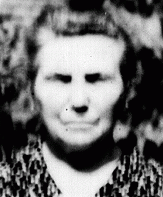
-
Genya Rotenberg
ID CardGenya and her brother, Nahum, were raised by Jewish parents in Lodz, Poland's second-largest city and an industrial center. Before the war, one-third of Lodz's inhabitants were Jewish. Genya's parents placed emphasis on their children's education. 1933-39: In 1939, when Genya was 9, the Germans occupied Lodz. After that, it was forbidden for "Jews, Gypsies and dogs" to be in public places. Since Jews weren't allowed to go to school, her parents arranged to tutor her secretly at home, but she couldn't keep…
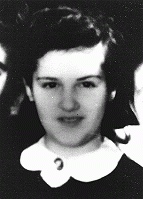
-
Bernard Krakauer
ID CardBernard was one of seven children born to a German-speaking, Jewish family in the small Moravian town of Mikulov in the central part of Czechoslovakia. The family later moved to the town of Hodonin where Bernard opened a dry-goods and clothing store. In 1899 he married Berta Koselova, and the couple had six children. During World War I Bernard served in the Austro-Hungarian army. 1933-39: In 1938 Bernard retired, and since none of his sons wanted to take over the business, Bernard sold it. He, his wife,…
